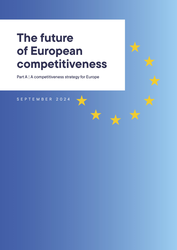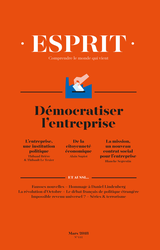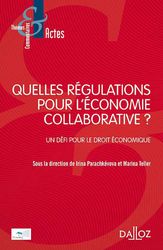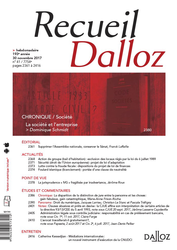Thesaurus : Doctrine


Dec. 6, 2024
MAFR TV : MAFR TV - Overhang

🌐suivre Marie-Anne Frison-Roche sur LinkedIn
🌐s'abonner à la Newsletter MAFR. Regulation, Compliance, Law
🌐s'abonner à la Newsletter Surplomb, par MAFR
____
► Référence complète : M.-A. Frison-Roche, "Régulation et Compliance", in série de vidéos Surplomb, 6 décembre 2024
____
🌐visionner sur LinkedIn cette vidéo de la série Surplomb
____
____
🎬visionner ci-dessous cette vidéo de la série Surplomb⤵️
____
Surplomp, par mafr
la série de vidéos dédiée à la Régulation, la Compliance et la Vigilance


Oct. 29, 2024
Thesaurus : Doctrine

► Référence complète : Mélanges offerts à Louis Vogel. La vie du droit, LexisNexis - Dalloz - LawLex - LGDJ, 2024, 828 p.
____
____
📗lire la table des contributions
____
► Présentation de l'ouvrage (faite par l'éditeur) : "Le droit est une matière vivante qui organise le monde réel et, comme Louis Vogel, évolue sans cesse.
Guidé par sa très forte envie d’agir, Louis Vogel a, dans chaque partie de sa vie professionnelle, fortement fait progresser la situation qu’il a trouvée à l’origine.
À l’Université, il apporte une contribution décisive, d’abord comme professeur, au travers de ses nombreux ouvrages et des masters qu’il a fondés et dirigés, notamment en droit économique français et européen ; ensuite, comme président de l’université Panthéon-Assas et président de France Universités, il réforme en profondeur, saisissant toujours toutes les opportunités.
Comme avocat, aux côtés de son frère Joseph, il fonde un cabinet spécialisé en droit de la concurrence, qui conseille les plus grands noms du secteur de l’automobile, de l’audiovisuel, de la distribution… et qui, dans de nombreuses affaires, fait évoluer la jurisprudence. Toujours ouvert aux nouveautés, Louis Vogel travaille, en parallèle, sur l’application de l’intelligence artificielle au droit.
En politique, comme maire et président de l’agglomération de Melun puis, plus récemment, comme sénateur, il poursuit son action au service de la collectivité et, après, en tant que professeur, avoir enseigné le droit et, en tant qu’avocat, l’avoir appliqué, désormais, en tant que sénateur, il le crée.
Convaincu que la liberté, la prudence et la confiance conditionnent la réussite, Louis Vogel a, durant toutes ces années, accompagné, et souvent, anticipé les mutations de notre société. La richesse et la diversité des articles composant ses Mélanges démontrent qu’il a transmis à ceux qui ont cheminé avec lui cette curiosité et cette humanité."
____
📝lire une présentation de l'article de Marie-Anne Frison-Roche : "Naissances d'une branche du Droit : le Droit de la Compliance"
________
Sept. 12, 2024
Conferences

🌐follow Marie-Anne Frison-Roche on LinkedIn
🌐subscribe to the Newsletter MAFR Regulation, Compliance, Law
____
► Full Reference: M.-A. Frison-Roche, participation to the round table "Le droit à l'enfant : réalité ou faux concept ?" ("The right to a child: reality or false concept?"), in Regards croisés sur les nouvelles filiations, Cour d'appel de Paris (Paris Court of Appeal), September 12, 2024
____
🧮see the full programme of this event
____
► Summary of the conference:
________
Sept. 9, 2024
Thesaurus : Doctrine

► Référence complète : M. Draghi, The future of European competitiveness, rapport, septembre 2024, 397 p., dit "rapport Draghi"
____
📓lire la première partie du rapport Draghi, A competitiveness strategy for Europe
► Référence complète : M. Draghi, The future of European competitiveness. Part A - A competitiveness strategy for Europe, rapport, septembre 2024, 69 p.
____
📓lire la seconde partie du rapport Draghi, In-depth analysis and recommendations
► Référence complète : M. Draghi, The future of European competitiveness. Part B - In-depth analysis and recommendations, rapport, septembre 2024, 328 p.
________

May 4, 2023
Publications

🌐 follow Marie-Anne Frison-Roche on LinkedIn
🌐 subscribe to the Newsletter MAFR Regulation, Compliance, Law
____
► Full reference: M.-A. Frison-Roche, Use of private companies by Compliance Law to serve Human Rights, Working Paper, May 2023.
____
This Working Paper is the basis of:
🎤a conference done in French in Toulouse on June 16, 2023
____
►Summary of this Working Paper: Following the legal tradition, Law creates a link between power with a legitimate source, the State, public power being its prerogative, while private companies exercise their power only in the shadow of this public power exercised ex ante. The triviality of Economic Law, of which Competition Law is at the heart, consisting of the activity of companies that use their power on markets, relegates the action of the State to the rank of an exception, admissible if the State, which claims to exercise this contrary power, justifies it. The distribution of roles is thus reversed, in that the places are exchanged, but the model of opposition is shared. This model of opposition exhausts the forces of the organisations, which are relegated to being the exception. However, if we want to achieve great ambitions, for example to give concrete reality to human rights beyond the legal system within which the public authorities exercise their normative powers, we must rely on a new branch of Law, remarkable for its pragmatism and the scope of the ambitions, including humanist ambitions, that it embodies: Compliance Law.
Compliance Law is thus the branch of Law which makes the concern for others, concretised by human rights, borne by the entities in a position to satisfy it, that is to say the systemic entities, of which the large companies are the direct subjects of law (I). The result is a new division between Public Authorities, legitimate to formulate the Monumental Goal of protecting human beings, and private organisations, which adjust to this according to the type of human rights and the means put in place to preserve them. Corporations are sought after because they are powerful, in that they are in a position to make human rights a reality, in their indifference to territory, in the centralisation of Information, technologies and economic, human, and financial means. This alliance is essential to ensure that the system does not lead to a transfer of political choices from Public Authorities to private companies; this alliance leads to systemic efficiency. The result is a new definition of sovereignty as we see it taking shape in the digital space, which is not a particular sector since it is the world that has been digitalised, the climate issue justifying the same new distribution of roles (II).
________
🔓read the full developments below⤵️
Feb. 1, 2023
Thesaurus : Doctrine
► Référence complète : J.-Ch. Roda, "Le Digital Markets Act (1re partie). Contrôler les contrôleurs d’accès", Communication - Commerce électronique, n° 2, février 2023, étude 4
____
► Résumé de l'article (fait par l'auteur) : "Le règlement (UE) 2022/1925 relatif aux marchés contestables et équitables dans le secteur numérique a été adopté le 14 septembre 2022. Mieux connu sous le nom de « Digital Markets Act », ou DMA, c’est un texte très technique de plus d’une soixantaine de pages. Il est destiné à « mettre au pas » les grandes plateformes américaines et européennes, en ancrant largement la régulation dans l’ex ante. Incontestablement, il s’agit d’un des dispositifs les plus ambitieux adoptés à l’échelon européen, qui doit permettre d’assurer une meilleure contestabilité sur les marchés numériques, et une plus grande loyauté des comportements. Un texte aussi important appelait un commentaire « grand format ». La première partie de celui-ci figure dans le présent numéro de la revue, et s’attache à cerner l’esprit et l’étendue du contrôle prévu par le DMA. La seconde partie, intitulée « Contraindre les contrôleurs d’accès », sera publiée dans le prochain numéro".
____
🦉Cet article est accessible en texte intégral pour les personnes inscrites aux enseignements de la Professeure Marie-Anne Frison-Roche
____
📝consulter une présentation de la première partie de cette étude de Jean-Christophe Roda, "Le Digital Markets Act (2e partie). Contraindre les contrôleurs d'accès"
________
Sept. 1, 2022
Thesaurus : Doctrine

► Full Reference: M. Malaurie-Vignal, "Les buts monumentaux du droit du marché. Réflexion sur la méthode" ("The Monumental Goals of Market Law. Reflections on the method"), in M.-A. Frison-Roche (ed.), Les Buts Monumentaux de la Compliance, coll. "Régulations & Compliance", Journal of Regulation & Compliance (JoRC) and Dalloz, 2022, p. 85-100.
____
📕read a general presentation of the book, Les Buts Monumentaux de la Compliance, in which this article is published
____
► Summary of the article (done by the Journal of Regulation & Compliance): The analysis done by this article is about Competition Law, and the methodology needed to be adopted for the technical functioning of this branch of Law. Taking up the various economic and legal theories on this subject, conceptions which have succeeded and clashed, the author develops that the monumental goal of Market Law is to develop an economic environment favorable to businesses and consumers, then asks the question if it could integrate an ethical dimension and more broadly non-economic considerations, in particular humanistic ones.
________
Sept. 1, 2022
Thesaurus : Doctrine

► Full Reference: M.-E. Boursier, "Les buts monumentaux de la compliance : mode d'expression des États" ("Compliance Monumental Goals: States' mode of expression"), in M.-A. Frison-Roche (ed.), Les Buts Monumentaux de la Compliance, coll. "Régulations & Compliance", Journal of Regulation & Compliance (JoRC) and Dalloz, 2022, p. 467-474.
____
📕read a general presentation of the book, Les Buts Monumentaux de la Compliance, in which this article is published
____
► Summary of the article (done by the Journal of Regulation & Compliance): "Monumental goals" are the raison d'être of Compliance and give it meaning: they are enriched with a political objective making it rise to the status of true legal norms. Compliance Law emerged from the confrontation of States with globalisation, leading to an eviction of traditional legal notions. The monumental goals are the expression of public policies that can be deployed in such a context, thanks to the articulation that Compliance builds with private stakeholders, who spontaneous or constrained contribute.
Through this new Law, States regain their agility face to markets. Indeed, these monumental goals justify this new responsibility weighing on the companies and the new powers that the States express beyond their traditional borders.
________
March 30, 2021
Newsletter MAFR - Law, Compliance, Regulation

Full reference: Frison-Roche, M.-A., Why do we regulate? If it is to prevent systemic risks, systemic "family offices" must be subject to it (Archegos case) (Pourquoi régule-t-on? Si c'est pour prévenir les risques systémiques, les "family offices" systémiques doivent y être soumis (cas Archegos)), Newsletter MAFR - Law, Compliance, Regulation, 30th of March 2021
Read by freely subscribing other news of the Newsletter MAFR - Law, Compliance, Regulation
Summary of the news:
Archegos was a wealth management company whose activity consisted mainly in managing funds that were not themselves from the financial markets (hence its title of "family office"). Obviously, Archegos was proving to be too fragile financially in view of the highly speculative commitments it made on the financial markets and systemic banks were particularly deeply affected by the liquidation of large amounts by Archegos to be able to respond to margin calls.
As the mandate of the financial regulatory authorities is aimed almost exclusively at the protection of public savings, Archegos completely escaped the regulation and supervision of the Securities and Exchange Commission (SEC). However, Regulation Law also aims to prevent and manage systemic risks, which are often multi-sectoral and even trans-sectoral, and this in a teleological way. In view of this and the increasingly important place taken by speculative behavior in the financial markets, the financial regulatory authorities must give up the condition of using public savings in their consideration of operators which should be regulated because even an operator not handling public savings can threaten the existence of financial markets. From this perspective, "family offices", not handling public savings but having a systemic dimension, must come under the regulation and supervision of financial regulatory authorities.
Dec. 8, 2020
Thesaurus : Doctrine

► Référence complète : J.-Ch. Roda, "Le marché", in J.-B. Racine (dir.), Le droit économique au XXIe siècle. Notions et enjeux, LGDJ, coll. "Droit & Économie", 2020, pp. 493-512.
____
📕consulter une présentation générale de l'ouvrage, Le droit économique au XXIe siècle. Notions et enjeux, dans lequel cet article est publié
____
📚consulter la présentation des autres ouvrages de cette collection, fondée et dirigée par Marie-Anne Frison-Roche
____
🦉Cet article est accessible en texte intégral pour les personnes inscrites aux enseignements de la Professeure Marie-Anne Frison-Roche
________
Oct. 9, 2020
Thesaurus : Soft Law
Full reference: Financial Stability Board, The Use of Supervisory and Regulatory Technology by Authorities and Regulated Institutions. Market Developments and Stability Implications, Report of 9th of October 2020, 36 p.
Read the presentation of the report by the Financial Stability Board
To go further on the question of the use of new technologies in regulatory processes, read Marie-Anne Frison-Roche's working paper: Analysis of blockchains with regards with the uses they can fulfill and the functions that the ministerial officers must ensure

April 24, 2020
Publications

Its subject is the confrontation between the current health crisis situation and the Compliance Law.
Summary. After defining Compliance Law, distinguishing the procedural and poor definition and the substantial and rich definition, the starting point is to admit the aporia: the type of health crisis caused by Covid-19 will be renewed and it is imperative to prevent it, even to manage it, then to organize the crisis exit. Public Authorities are legitimate to do so, but because this type of crisis being global and the State being consubstantially linked to borders, States are hardly powerful. Their traditional International Law shows their limits in this current crisis and one cannot hope that this configulration will improve radically.
In contrast, some companies and markets, notably the financial markets, are global. But the markets are not legitimate to carry out such missions and counting on the generosity of certain large companies is far too fragile in front of the "monumental goal" that is the prevention of the next health crisis, crisis which must never happen.
How to get out of this aporia?
By Compliance Law, basis of, in a literal and strong sense, the "Law of the Future".
We need to be inspired by the Banking and Financial Compliance Law. Designed in the United States after the 1929 crisis to tend towards the "monumental goal" of the absence of a new devastating crisis in the country and the world, this set of new legal mechanisms gave duty and power of supervision, regulation and compliance to market authorities and central bankers. These are independent of governments but in constant contact with them. Today, they claim to have as first priority the fight against climate change. Now and for the future, they must also be given the responsibility and the powers to prevent a global health disaster, similar to a global ecological disaster, similar to a global financial disaster. This does not require a modification of the texts because their mandate consists in fighting instability. Stability must become a primary legal principle, of which the fight against monetary instability was only a first example. By the new use that central banks must make of it by preventing and managing health crises, Compliance Law will ensure that the future will be not catastrophic.

March 22, 2020
Publications

This working paper is the basis for an article in the French Law Journal Le Clunet.
When we compare the terms "Compliance" and "Extraterritoriality", it is often with dissatisfaction, even anger and indignation. On the momentum, after having expressed a principle of disapproval of such a merger, attention is focused on how we can fight against it, to break the link between Compliance and Extraterritoriality. But do we have to go so fast? Is this negative initial assessment correct?
Indeed, thus gone, it is frequently explained that the binding mechanisms of Compliance are suffered, that they come from abroad!footnote-1750, that they apply with efficiency but in an illegitimate way, without agreement of the one who must submit to it, whose resistance is therefore certainly ineffective but nevertheless justified. In the same spirit, when we start to shell the cases, like so many scars, sort of rosary, even crown of thorns, BNPP case!footnote-1718, Astom case!footnote-1717, etc., the wounds not yet closed turn into reproaches made against the rules, public authorities, even reproaches made against named people.
We are leaving this kind of complaint against X, which targets what would be this appalling "Compliance", this Law which would be both hostile and mechanical which would not have been able to stay within the limits of borders, Compliance being thus placed in contrast to sovereignty and protection, which presuppose staying within its limits!footnote-1716 and being able to protect companies from abroad. More concretely, this presentation targets more directly the United States, which uses "the legal weapon", slipped under what is then designated as "the artifice of the Law" with extraterritorial scope. But this effect would in reality be the very object of the whole: their hegemonic will to better organize at least a global racket, notably through the Foreign Corrupt Practices Act (FCPA) and at best a world government through notably the embargoes.Those who believed otherwise would be naive or foolish. This silences the opponents because who likes this costume? So the world would be put in a ruled cut; what the mafia could not have done, Compliance Law would have obtained, offering the whole world to the United States thanks to the extraterritoriality of its national Law.
Compliance Law would thus become the very negation of Law, since it has the effect, even the purpose (barely concealed by strategic, powerful and shameless States), of counting borders for nothing, whereas Public International Law, in that it is built between the sovereign subjects of law that are the States presupposes the primary respect for borders to better exceed them while Private International Law takes the same postulate to better welcome foreign Law in situations presenting a foreign element!footnote-1726. Jurists believed in the force of Law; by Compliance, we would return to the sad reality that only the powerful, here the United States, dominate and - ironically - it is under the pretext of Law that they do it. It would be necessary to be well duped, or accomplice, to see there still legal where there is only the balance of powers. When one is more intelligent or skilful than that, one understands that the "small" can only be "subject" to the Compliance Law, one would have to be powerful to be the normative source and its enforcement agent. It is then towards this mis-named Department of Justice (DoJ) that the fearful, hateful and resigned glances turn.
If you see it that way, what should you do then? The answer is obvious: react!
It is necessary to save the sovereignty, France, companies, the Law itself. If that is how the question is posed, how can we disagree? It is therefore necessary to destroy the Compliance Law and the extra-territoriality of American Law which had found this "Trojan horse", an expression so frequently used. This is the basis for the administrative reports available, for example the Berger-Lellouche!footnote-1719 parliamentary reports and the Gauvainfootnote-1720 report. Both of them broadly develop the two preceding claims, namely that the extra-priority of compliance mechanisms is illegitimate and harmful, since it is a mechanism invented by the Americans and harming the Europeans, or even invented by the Americans to harm Europeans, the description being made in much more violent terms than those used here. The description seems acquired, the reflections therefore relate to the remedies. The reaction is most often to "block" the Compliance Law in its extraterritorial effect.
But without discussing the effectiveness of the remedies proposed downstream, it is necessary to return to this description so widely shared made upstream. Because many elements on the contrary lead to affirm that ComplianceLaw first of all and by nature can only be extraterritorial and that it must be. Whether or not the State in which it was created has malicious intentions. The description which is made to us most often describes particular cases from which we draw generalities, but we cannot reduce Compliance Law to the already cooled cases, as BNPP case, or to the always hot case of the American embargo on Iran. Furthermore, one cannot take the issue of embargoes and draw conclusions, legitimate for it, but which would apply to the whole of Compliance Law. The fact that theCompliance Law is a branch of Law at the stage still of emergence can lead to this confusion which consists in taking the part for the whole, but it is very regrettable because what is justified for the embargoes does not is in no way relevant for all Compliance Law, of which precisely the Law of embargoes is only a small part, even an abusive use. This overlapping is not often perceived, because the definition of Compliance Law and its criterion are not clearly enough defined, namely the existence of a "monumental goal"!footnote-1725, which does not exist in an embargo decided unilaterally by an order decreed by the President of the United States, but which exists in all other cases and fully justifies extraterritoriality, extraterritoriality which is even consubstantial with Compliance Law (I).
Once we have distinguished the embargoes, as an atypical, sometimes even illegitimate part, of Compliance Law, we should continue this work of distinction by emphasizing that the United States has certainly invented Compliance Law!footnote-1721 but only developed a mechanical concept for the prevention and management of systemic risks. Europe has taken up this systemic conception of the protection of systems, for example financial or banking, but superimposed another conception, drawing on its deep humanist tradition!footnote-1722, whose protection of personal data is only an example and whose monumental goal is the protection of the human being. This primary concern then justifies the European use of Compliance mechanisms to interfere with global objects regardless of their location, especially the environment, and to block the entry onto the ground of objects that enter, which is contrary to Competition Law but builds a legitimate barrier under this Compliance Law, in the indifference of an extraterritorial origin (II).
Indeed, this branch of the new Law which is Compliance Law is not reducible to Competition Law!footnote-1723, any more than it is not reducible to a method. It is a substantial, extraterritorial Law because the "monumental goals" which give it substantial unity are extraterritorial. This can directly contribute to the future of a Europe which on the one hand will be able to pursue, in an extraterritorial manner, monumental humanist goals, in the field of the environment or the protection of personal information or access to the Law (in particular by the technique of compliance programs) and which, on the other hand, by the techniques of traceability of products!footnote-1724, will have the means not to bring in products manufactured in an indecent manner, except in countries which do not grant value than in Competition Law to enter the WTO.
Read the developments below.
June 28, 2019
Publications

It is often observed, even theorized, even advised and touted, that Compliance is a mechanism by which public authorities internalize political (eg environmental) concerns in big companies, which accept them, in Ex Ante, because they are rather in agreement with these "monumental goals" (eg saving the planet) and that this shared virtue is beneficial to their reputation. It is observed that this could be the most successful way in new configurations, such as digital.
But, and the Compliance Mechanism has often been brought closer to the contractual mechanism, this is only relevant if both parties are willing to do so. This is technically true, for example for the Deferred Prosecution, which requires explicit consent. This is true in a more general sense that the company wants to choose itself how to structure its organization to achieve the goals politically pursued by the State. Conversely, the compliance mechanisms work if the State is willing to admit the economic logic of the global private players and / or, if there are possible breaches, not to pursue its investigations and close the file it has opened, at a price more or less high.
But just say No.
As in contractual matters, the first freedom is negative and depends on the ability to say No.
The State can do it. But the company can do it too.
And Daimler just said No.
___
Publicly, including through an article in the Wall Street Journal of June 28, 2019.
The company sets out in a warning to the market that it is the object of a requirement on the part of the German Motor Authority (Kraftfahrt-Bundesamt) of an allegation of fraud, by the installation of a software, aimed at misleading instruments for measuring emissions of greenhouse gases on cars using diesel.
It is therefore an environmental compliance mechanism that would have been intentionally countered.
On this allegation, the Regulator both warns the company of what it considers to be a fact, ie compliance fraud, and attaches it to an immediate measure, namely the removal of the circulation of 42,000 vehicles sold or proposed by Daimler with such a device.
And the firm answers : "No".
_____
Which is probably only beginning, since a No ends the dialogue of Ex Ante to project in the Ex Post sanction procedures, calls 6 observations:
- 1. No doubt Daimler, a German car manufacturing company, has it in mind in this allegation of fraud calculating pollution of its diesel cars what happened to his competitor Volkswagen: namely a multi-billion dollar fine, for lack of compliance in a similar hypothesis (so-called dieselgate). The strategic choice that is then made depends on education through the experience of the company, which benefits as such from a previous case that has had a very significant cost. Thus educated, the question is to measure the risk taken to refuse any cooperation, when the company can anticipate that it will still result in such an amount ....
- 2. In addition, we find the difficulty of the distinction of Ex Ante and Ex Post. Indeed, saying No will involve for the company a cost of confrontation with the Regulator, then the peripheral jurisdictions or review courts. But in Germany, the Government itself, concerning a bank threatened with compliance proceedings and almost summoned by the US regulator to pay "of its own free will" a transactional fine, felt that this was not normal, because it must be the judges who punish, after a contradictory procedure with due process and after established facts.
- 3. However, this is only an allegation, of probable assertions, of what legally allows to continue, but which does not allow to condemn. The confusion between the burden of proof, which presupposes the obligation to prove the facts before being able to sanction, and the burden of the allegation, which only supposes to articulate plausibility before being able to prosecute, is very damaging, particularly if we are committed to the principles of Repressive Law, such as the presumption of innocence and the due process. This distinction between these two probationary charges is at the heart of the probatory system in the Compliance Law. Because Compliance Law always looks for more efficiency, tends to go from the first to the second, to give the Regulator more power, since businesses are so powerful ....
- 4. But the first question then arises: what is the nature no so much of the future measure to be feared, namely a sanction that could be taken later, against Daimler, if the breach is proven, or which will not be applied to the firm if the breach is not established; but what is the nature of the measure immediately taken, namely the return of 42,000 vehicles?
- This may seem like an Ex Ante measurement. Indeed, the Compliance assumes non-polluting cars. The Regulator may have indications that these cars are polluting and that the manufacturer has not made the necessary arrangements for them to be less polluting (Compliance) or even organized so that this failure is not detected ( Compliance fraud).
- This allegation suggests that there is a risk that thiese cars will polluting. They must immediately be removed from circulation for the quality of the environment. Here and now. The question of sanctions will arise after that, having its procedural apparatus of guarantees for the company that will be pursued. But see the situation on the side of the company: having to withdraw 42,000 vehicles from the market is a great damage and what is often called in Repressive Law a "security measure" taken while the evidence is not yet met could deserve a requalification in sanction. Jurisprudence is both abundant and nuanced on this issue of qualification.
- 5. So to withdraw these cars, it is for the company to admit that it is guilty, to increase itself the punishment. And if at this game, taken from the "cost-benefit", as much for the company immediately assert to the market that this requirement of Regulation is unfounded in Law, that the alleged facts are not exacts, and that all this the judges will decide. It is sure at all whether these statements by the company are true or false, but before a Tribunal no one thinks they are true prima facie, they are only allegations.
- And before a Court, a Regulator appears to have to bear a burden of proof in so far as he has to defend the order he has issued, to prove the breach which he asserts exists, which justifies the exercise he made of his powers. The fact that he exercises his power for the general interest and impartially does not diminish this burden of proof.
- 6. By saying "No", Daimler wants to recover this classic Law, often set aside by Compliance Law, classic Law based on burden of proof, means of proof, and prohibition of punitive measures - except imminent and future imminente and very serious damages - before 'behavior could be sanctioned following a sanction procedure.
- Admittedly, one would be tempted to make an analogy with the current situation of Boeing whose aircraft are grounded by the Regulator in that he considers that they do not meet the conditions of safety, which the aircraft manufacturer denies , Ex Ante measurement that resembles the retraction measure of the market that constitutes the recall request of cars here operated.
- But the analogy does not work on two points. Firstly, flight activity is a regulated activity that can only be exercised with the Ex Ante authorization of several Regulators, which is not the case for offering to sell cars or to drive with. This is where Regulatory Law and Compliance Law, which often come together, here stand out.Secundly, the very possibility that planes of which it is not excluded that they are not sure is enough, as a precaution, to prohibit their shift. Here (about the cars and the measure of the pollution by them), it is not the safety of the person that is at stake, and probably not even the overall goal of the environment, but the fraud with respect to the obligation to obey Compliance. Why force the withdrawal of 42,000 vehicles? If not to punish? In an exemplary way, to remind in advance and all that it costs not to obey the Compliance? And there, the company says: "I want a judge".
______
Nov. 5, 2018
Publications

Référence générale : Frison-Roche, M.-A., Banque et concurrence, in "Mélanges en l'honneur du professeur Claude Lucas de Leyssac", LexisNexis, 2018, pp.165-180.
Résumé : Banque et concurrence ne font pas bon ménage. Ce n'est pas tant que les banques feraient figure de récidivistes à propos desquels les autorités de concurrence devraient hausser le ton par des sanctions toujours plus lourdes afin que la leçon concurrentielle soit enfin entendue. Ce sont plutôt deux ordres qui s'affrontent, deux incompréhensions face à face. En effet les banques trouvent adéquat de s'entendre pour que le système bancaire fonctionne. Plus encore, les pouvoirs publics leur demandent un comportement politique en finançant l'économie lorsque celle-ci ne s'appuie pas sur les marchés financiers, voire de lutter contre l'exclusion sociale en pratiquant « l'inclusion bancaire », bastion avancé de la conception de l'entreprise promue par le Plan très politique d'Action pour la Croissance et le Transformation des Entreprises (PACTE). dès lors, comment elles-mêmes auraient-elles un comportement de marché consistant dans un comportement égoïste et d'agression envers leur homologue ?
Si l'on plonge dans ce creuset de l'incompréhension qui engendre le heurt violent entre les banques, qui évoquent leur mission, et les autorités de concurrence, qui se prévalent de la leur, on bute sur l'écueil de la définition même de ce qu'est une banque. L'on peut estimer qu'une banque est un prestataire de services divers, agissant sur des marchés en concurrence ; le droit assure le bon fonctionnement de ceux-ci, les autorités qui gardent l’efficacité des marchés se saisissant des banques qui y exercent leurs activités. Mais si l'on choisit d'insister sur le fait que les banques sont ce qui fait fonctionner l'économie et consolident le lien social, elles sont alors partie intégrante d'un système propre : le système bancaire, lequel est un élément essentiel de la société. La concurrence n'y est plus qu'adjacente.

Oct. 1, 2018
Publications

► Full Reference: Frison-Roche, M.-A., Competition Law & Compliance Law , Working Paper, October 2018.
____
► this Working Paper has served as basis for an Article published later in French in the Review Concurrences ; read the presentation in English of this Article.
____
► Summary and introduction : Compliance Law is a new branch of Law, still under construction. One can have a "narrow definition" of seeing it as the obligation of businesses to show that they are constantly and actively complying with the law. One can have a richer definition, of a substantive nature, defining it as the obligation or the own will of certain companies to achieve "monumental goals" that go beyond economic and financial performance.The Competition Law partly integrates its two conceptions of Compliance: Precursor, the Competition Law concretizes dynamically the first conception of the Compliance Law (I) It is with more difficulties but also much more future that the Competition Law can express in dialectic the second conception of the Compliance Law as internationalization of these "monumental goals", especially in the digital space (II).

Updated: Sept. 8, 2018 (Initial publication: April 30, 2018)
Publications

► This working document was intended to serve as a support for a conference pronounced in French in the conference Droit et Ethique ( Law & Ethics) of May 31, 2018 in a symposium organized by the Court of Cassation and the Association Française de Philosophie du Droit. French Association of Philosophy of Law on the general theme Law & Ethics.
See a general presentation of this conference.
Rather, it has served as a support for the article to be published in the Archives de Philosophie du Droit (APD). This article is written in French.
► Summary: It is through the Law that the human being has acquired a unity in the West (I). What religion could have done, the Law also did by posing on each human being the indetachable notion of him of "person" (I.A). But this is what is challenged today, not the personality and the power that the human being has to express his freedom but the unity that implies in the disposition that we have of ourselves in repelling the desire that others have always had to dispose of us. Current law tends to "pulverize" human beings into data and transform into neutral legal services what was considered before as the devouring of others. The legal concept of "consent", ceasing to be proof of a free will but becoming an autonomous concept, would suffice (I.B.).
To prevent the reigning of the "law of desires", which merely reflects the adjustment of forces, we must demand here and now the ethical sovereignty of Law, because Law can not be just just be just the interests adjustment (II). We can form this request if we do not want to live in an a-moral universe (II.A), if we see that the unity of the person is the legal invention that protects the weak human being (II.B.). If we admit this imperative, then we must finally ask who in the legal system will express and impose it, especially the legislator or the judge, because we seem to have lost the ability to recall this principle of the Person on which the West was so centered. But the principles that are no longer said disappear. There would then remain only the case-by-case adjustment of interests between human beings in the world field of particular forces. At this yardstick, Law would be more than a technique of securisation of particular adjustments. Law would be reduced at that and would have lost its link with Ethics. (II.C).
May 31, 2018
Conferences

Référence générale : Frison-Roche, M.-A., La garde de l'unité de la personne dans un système a-moral, in Cour de cassation & Association française de philosophie du Droit, Droit & Ethique 31 mai 2018, Paris.
Lire le programme disponible sur le site de la Cour de cassation.
Lire une présentation générale du colloque.
Lire une présentation des observations finales par ailleurs présentée..
Résumé de la contribution : Le Droit a pour fonction de protéger l'être humain. Si l'on confronte la situation concrète des être humains et la puissance du Droit (I), le Droit peut donner une unité à l'être humain, unité qu'il n'a pas ni par nature ni par la société, par l'invention juridique de la personnalité (I.A). Mais le Droit est aujourd'hui lui-même tenté de pulvériser l'unité de la personne, notamment à travers le "Droit des données" et le "Droit des prestations corporelles", ce dont la GPA est le bastion avancé (I.B). L'on songe alors à requérir la souveraineté éthique du Droit (II) Pourquoi ? Parce qu'il y a urgence à maintenir l'unité de la personne humaine grâce au Droit, en raison de l'a-moralité d'un monde sans limite, gouverné par la rencontre livre des désirs (II.A) en retenant l'hypothèse d'un droit "de principe" (II.B), d'un Droit qui peut exprimer les principes éthiques garantissant à l'être humain d'être pas la matière première de marchés de l'humain qui se construisent sous nos yeux (II.C).
Faute de temps, cette contribution n'a pas pu être présentée.
Lire le document de travail sur la base duquel la conférence a été élaborée.
Ce travail sera utilisé pour l'élaboration d'un article à paraître aux Archives de Philosophie du Droit
May 19, 2018
Blog

Il y a quelques jours, dans une réunion j'écoutais Alain Supiot.
Et cela m'a fait penser à un article sous presse que je viens de lire d'une ancienne élève à laquelle j'avais consacré des journées entières pour la guider dans son travail.
Puis ce matin, j'ai lu un extrait d'un livre de Bernard Maris.
Et cela m'a fait penser à des pages de Nietzsche.
Et je me suis dit : la question n'est-elle pas d'échapper non pas du tout à celle de la dette, qui est une question éthique et juridique fondamentale, une notion vaste et belle, mais à une sorte de piège, étroit et mortifère dans lequel il n'y aurait comme "place de référence" comme la place de "débiteur" ou bien la place de "créancier". A la fois en éthique, en économie et en droit.
Et si l'on a tant de mal à trouver notre place, n'est-ce pas parce qu'être "débiteur" peut renvoyer à deux positions qui n'ont rien à voir l'une avec l'autre ? L'une dans laquelle nous portons une dette qui suppose l'existence d'un créancier (ce qui suppose toujours une exécution à venir, une opposition, une violence), et l'autre dans laquelle nous portons une dette qui pourrait exister sans qu'existe un créancier ?
Lire ci-dessous

Updated: April 4, 2018 (Initial publication: Nov. 12, 2017)
Publications

Pour lire l'article en français, cliquer sur le drapeau français.
This working paper serves as a support for an article published in French in the Recueil Dalloz.
In Lisbon, in the Web Summit of November 2017, a machine covered with a skin-like material and a sound-producing device gave a speech in public at this conference on digital. For example, a French article tells the event by this title : Le premier robot citoyen donne sa propre conférence au web summit (The first citizen robot gives his own conference to the web summit).
Some time later, reports show the same robot walking and taking more than 60 facial expressions, the text laudatif that accompanies the images designating the automaton by the article: she.
The machine, which falls legally within the category of "things", is thus presented as a person.
Let's look elsewhere.
Women, who are human beings, sign contracts by which they agree to give birth to children, with whom they claim they have no connection, that they are not mothers, that they will hand them over immediately at the exit of their belly to those who desired their coming, this desire for parenthood creating by hitself the true and only link between the child and his "parents of intent". The mother-carrier is often openly referred to as "oven".
The woman, who falls legally within the category of the "person", is thus presented as a thing.
The two sensational phenomena are of the same nature.
They call two questions:
1. Why? The answer is: money. Because both are the result of the new construction of two fabulous markets by supply.
2. How? The answer is: by the destruction of the distinction between the person and things.
The distinction between person and things is not natural, it is legal. It is the base of the western legal systems, their summa divisio.
If this distinction disappears, and for money to flow, it must actually disappear, then the weak human being will become the thing of the strong one.
Read below the developments.
It is true that in 1966, the BBC already presented a sort of robot being the "ideal" servant and designating it by the article "she".
Feb. 28, 2018
Thesaurus : Doctrine

► Référence complète : A. Supiot, "De la citoyenneté économique", Entretien réalisé par Thibault Le Texier, in Démocratiser l'entreprise, Esprit n° 442, 2018.
____
____
Les étudiants de Marie-Anne Frison-Roche peuvent consulter l'article en texte intégral.
Jan. 10, 2018
Thesaurus : Doctrine

Référence complète : Parachkévova, I., et Teller, M., (dir.) Quelles régulations pour l'économie collaborative ? Un défi pour le droit économique, Dalloz, coll. "Thèmes et commentaires", 2018, 202 p.
Nov. 30, 2017
Publications

► Référence complète : M.-A. Frison-Roche, La disparition de la distinction de jure entre la personne et les choses : gain fabuleux, gain catastrophique, in Recueil Dalloz, n°41, 30 novembre 2017, pp. 2386-2389.
____
► Résumé de l'article : Les robots se présentent comme des personnes, des systèmes juridiques leur conférant ce statut. Des femmes se présentent comme des purs et simples moyens, réification avalisée par certains. La cause est commune : les profits sans limite pour les concepteurs d'un marché mondial où des machines humanoïdes offrent toutes prestations sans limite, notamment sexuelles, miroir du marché des femmes, objets sexuels ou reproducteur (GPA). Cette évolution juridique archaïque est bloquée par la summa divisio entre la personne et les choses. Le Politique doit maintenir cette distinction qui n'est pas de fait mais "de droit".
____
lire le document de travail bilingue ayant servi de base à l'article.
____
________

Updated: Oct. 25, 2017 (Initial publication: May 27, 2016)
Publications

► Full Reference: Frison-Roche, M.-A., Globalization from the point of view of Law, working paper, May 2017.
____
🎤 This working paper initially served as a basis for a synthesis report made in French in the colloquium organized by the Association Henri Capitant in the International German Days on the subject of "Le Droit et la Mondialisation" (Law and Globalization).
📝 Il sert dans un second temps de base à l'article paru dans l'ouvrage La Mondialisation.
📝 it serves as a second basis for the article (written in English, with a Spanish Summary) to be published in the Brezilian journal Rarb - Revista de Arbitragem e Mediação (Revue d`Arbitrage et Médiation).
It uses the Bilingual Dictionary of the Law of Regulation and Compliance.
____
► Summary of the Working: Globalization is a confusing phenomenon for the jurist. The first thing to do is to take its measure. Once it has been taken, it is essential that we allow ourselves to think of something about it, even if we have to think about it. For example, on whether the phenomenon is new or not, which allows a second assessment of what is taking place. If, in so far as the law can and must "pretend" to defend every being, a universal claim destined to face the global field of forces, the following question - but secondary - is formulated: quid facere? Nothing ? Next to nothing ? Or regulate? Or can we still claim that the Law fulfills its primary duty, which is to protect the weak, including the forces of globalization?
____
read the Working Paper below⤵️